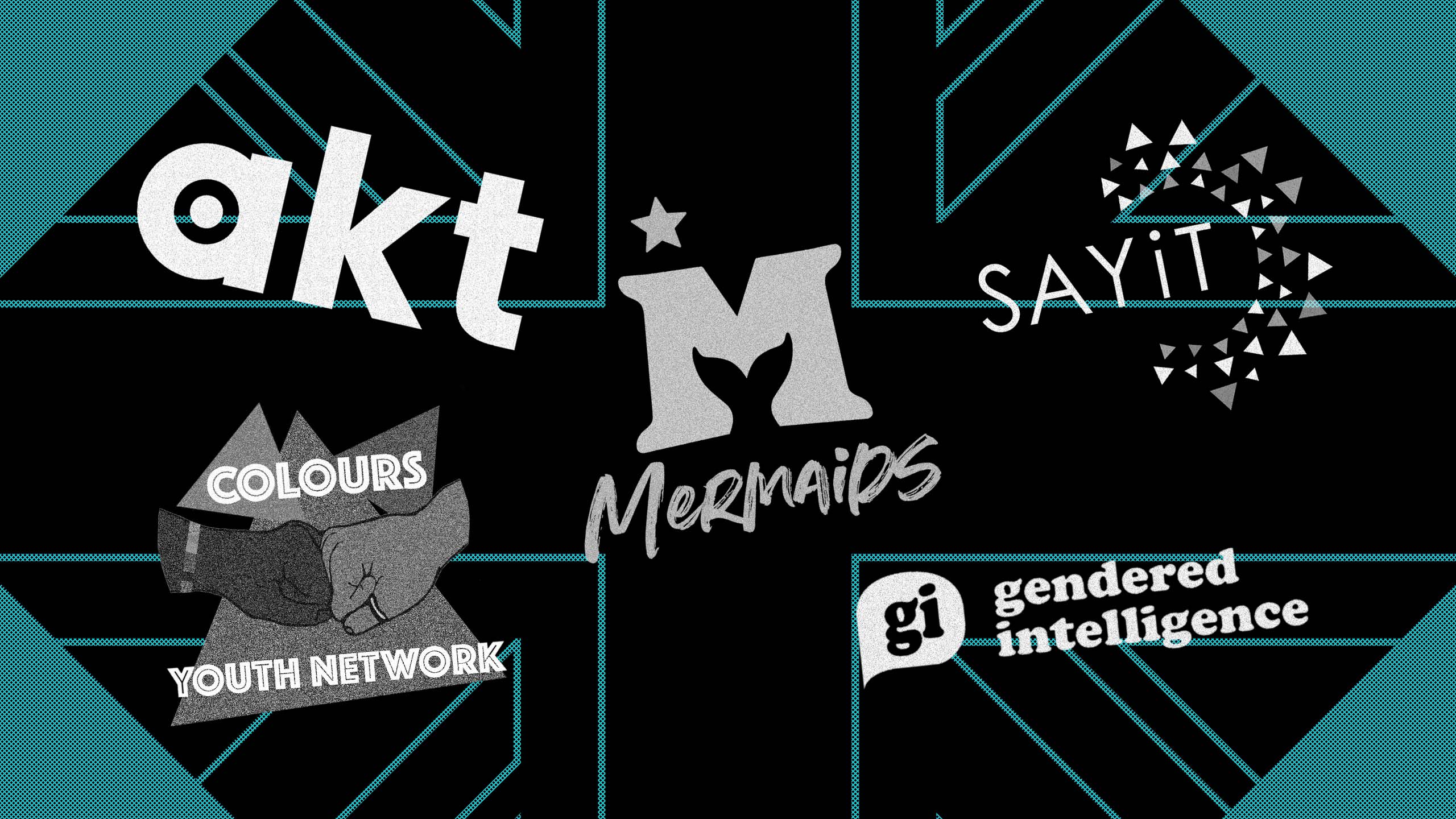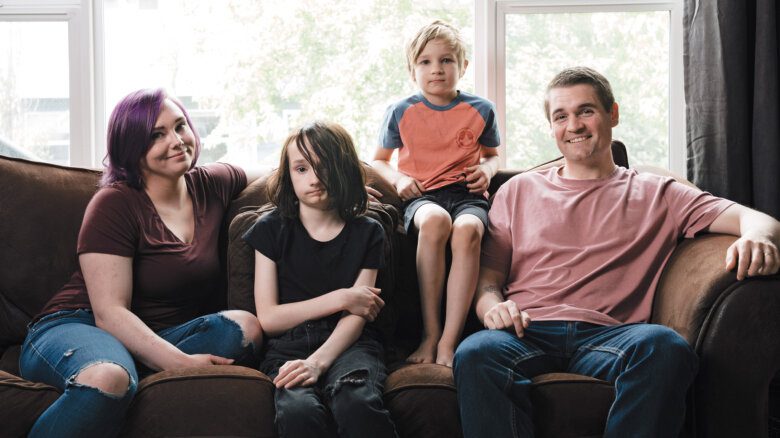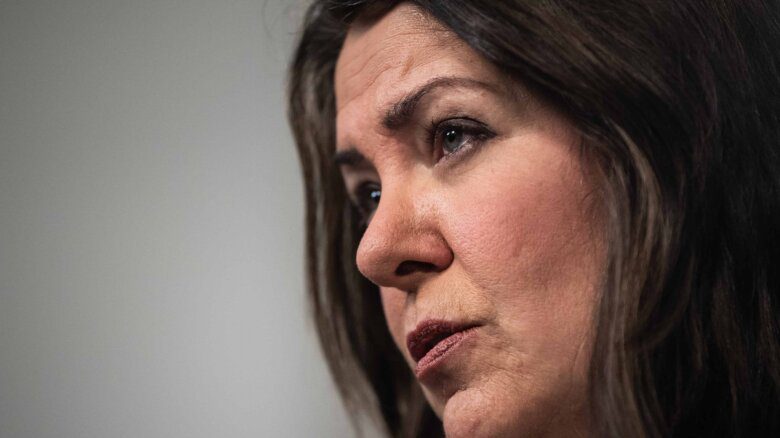In July, dozens of young trans and gender nonconforming people from across the U.K. made a joint pilgrimage to the seaside city of Brighton, for the city’s 10th annual Trans Pride.
Some of the youngsters had never met before. Plenty more came from marginalized and low-income backgrounds, which would usually make nationwide travel on Britain’s expensive railways near impossible. A handful had never felt safe to openly express their transness around friends and family, let alone in public. Despite these obstacles, they celebrated Trans Pride Brighton with glitter-soaked bodies, collective protest chants (“Fight the Cis-tem!”) and smiles plastered across their faces. Not only did they experience the gleeful, colourful chaos of Trans Pride, they made new friends and shared their stories with other young, like-minded people.
These euphoric moments wouldn’t have been possible without Gendered Intelligence (GI), a London-based non-profit organization that also hosts regular youth groups in Leeds, West Yorkshire. GI’s work is multifaceted and wide-ranging, but Communications Officer Cleo Madeleine describes youth work as “the heart” of their mission to protect trans communities. As well as offering more than 20 youth groups a month––a mixture of in-person and online––GI takes young people on camping trips, countryside excursions and special events, like the aforementioned Trans Pride holiday.
In a climate that relentlessly politicizes trans youth, these events are a balm. For a few hours a week, they get to lounge around on beanbag chairs, meet new people and throw themselves into weird and wonderful craft projects. From muddy but memorable camping weekends and group dinners to all-trans swimming sessions, the aim is to create lighthearted, friendly environments and to help with everything from housing and employment to mental health and domestic violence.
The U.K. has a network of similar organizations doing this vital work. There’s Sheffield-based SAYiT, which offers everything from free, gender-affirming items such as binders and packers, to craft workshops and free counselling. There’s the nationwide Colours Youth Network, which, according to their website, “disrupts white-led narratives” in youth work and specifically uplifts and creates space for LGBTQ+ people of colour. For young LGBTQ+ people struggling with homelessness, akt helps with housing and employment, as well as mentorship and training.
Especially given the U.K.’s transphobic media, doing this important work for trans youth is far from easy. “There’s this myth that being trans is new or dangerous,” says Madeleine, who points to cultural “anxiety” around transness, which ignores the fact that gender nonconformity has been recorded for centuries. “It’s quite often published that young people are rushed into gender-affirming surgeries,” she continues, before clarifying that “they’re not––in fact, they’re lucky if they can access gender-affirming healthcare at all.” This media misinformation can warp trans legislation, stoking the flames of a moral panic that only serves to further restrict the choices of already-marginalized youth.
Cal Horton, a researcher who recently completed a PhD on “cis-supremacy,” has studied the impacts of policies and institutions on trans youth for years. But they’re also the parent of a trans child, with years-long experience advocating for her rights, and trying to protect her safety and well-being. This work, they say, is gruelling and frustrating, especially as the voices of young trans people themselves are so often silenced. “When decisions, policy and discourse are driven by folks who do not know trans children or do not respect trans children as equals, we end up where we currently are in the U.K.,” Horton says, “which is a situation where policy and discourse actively cause harm to trans children and adolescents.”
This is especially true of the U.K.’s trans youth healthcare system, currently in a state of disarray. In July 2022, the Tavistock Clinic––the only child gender identity clinic in the United Kingdom––was closed down following endless media controversy. Established in 1989, the clinic did valuable work for decades, but became a media target as the so-called trans “culture war” intensified. Rising trans visibility has inevitably resulted in higher demand for their services, but wait-lists spiralled out of control and media pressure continued to mount.
The initial plan was to replace the clinic with two regional centres, to be opened in Spring 2023. At the time of writing, neither have opened: the southern centre has been delayed until Fall 2023, and the northern centre until Spring 2024.
Mermaids, the U.K.’s largest and best-known trans youth charity, has been a key source of fact-driven, accessible information about these changes. According to Bex Shorunke, the charity’s PR and media engagement manager, “access to timely, efficient and reliable trans healthcare” is one of the biggest issues facing trans youth right now. “Waiting lists for an initial appointment continue to grow (currently, the wait-time is over three years) and it’s just not good enough that no one will be taken off this list,” she explains. “This has a massive impact on the well-being and health of trans young people. Only a small minority can afford private healthcare, which can push them toward riskier decisions.”
While the focus of these organizations is on the health and well-being of trans youth, the adults who work with them are exposed to extreme mental health pressures too. In September 2022, right-wing newspaper The Telegraph published an “investigation” into Mermaids. The charity quickly put out a statement decrying a “smear campaign,” in which individual employees found themselves dragged through the mud. Their personal accounts were scoured for potential ammunition; their personal photos and details were leaked by anti-trans campaigners and weaponized against the charity.
The chaos led to the pause of a £500,000 grant and the temporary closure of Mermaids’ helpline, a lifeline for trans youth and their families.
Some of the arguments made against Mermaids were deeply personal, invasive and rooted in anti-trans determination to shutter the charity, but there were some valid concerns. In response, Mermaids commissioned a “frank and honest appraisal” of their internal culture, which exposed “discriminatory behaviour within the organization.” Mermaids quickly appointed a new interim CEO and have since committed to increased transparency, training and a pledge to “do better,” but the scars of the smear campaign have lingered, especially as it was largely trans employees who were targeted. Shorunke explains that trans employees in particular are at high risk of burnout. “Being on the front line supporting trans young people whose existence is continually being ‘debated’ can be emotionally and mentally taxing for many of us, particularly those of us who identify as non-binary or trans,” Shorunke says.
Shorunke says that Mermaids’ profile means staff are “more liable to scrutiny from the right-wing media and beyond.” The same can be said for trans youth organizations more broadly. Yet they’re determined to keep fighting; Madeleine says the Mermaids ordeal has only “strengthened [GI’s] resolve to keep standing up for the trans community.” Currently, she says a “thick skin” is, unfortunately, a job requirement for anyone working with LGBTQ+ youth. “We have to be really careful with the safety of our workers, especially those who go out and work with the public,” she continues. “We have to take extra care with our mental health, because we’re constantly exposed to hate and harassment.” Shorunke speaks similarly of Mermaids, explaining the importance of “spaces where we can vent, support each other and take breaks, as burnout can be common.”
These endless obstacles are worth navigating for the sake of trans youth themselves. There are countless heartwarming testimonials online from young people who––in their feedback for GI camp trips, they describe finding their “own little piece of paradise” and relaxing into a space where they can truly be themselves, and “not worry about gender or the world outside.” Horton finds solace in the “growing pockets of trans resistance, solidarity and joy” they’re seeing crop up, describing it as a “beautiful” experience to see the self-confidence of young LGBTQ+ grow as they “find spaces of safety and acceptance.”
Even though Madeleine jokingly describes herself as a “jaded media cynic,” she says it’s the testimonials from young trans people that spur her on. “When I was growing up as a young trans person, Section 28”––a U.K. bill that barred schools from teaching LGBTQ+ material, repealed in 2003––“was still in effect,” says Madeleine. “I couldn’t imagine it even being okay to talk about being trans at school, let alone there being dozens of youth groups and camps available.”
The work may be exhausting and fraught with obstacles, but Madeleine underscores that it’s vital. “It’s so important to show the trans community that someone is fighting for them,” says Madeleine, who reiterates GI’s determination to keep fighting. “These young people need to see and understand that we will get through this together.”
These groups rely on public support to sustain themselves, so you can donate to the likes of Mermaids, Gendered Intelligence, SAYiT, Colours Youth Network and akt directly through their websites.


 Why you can trust Xtra
Why you can trust Xtra


